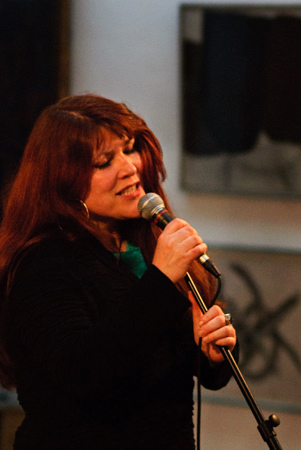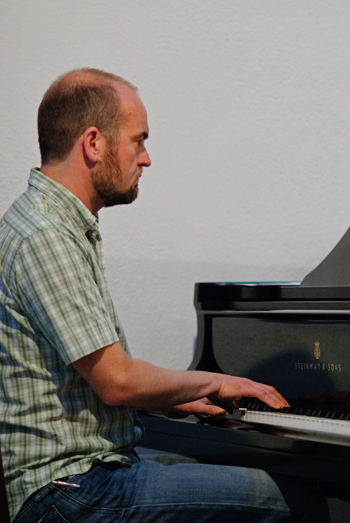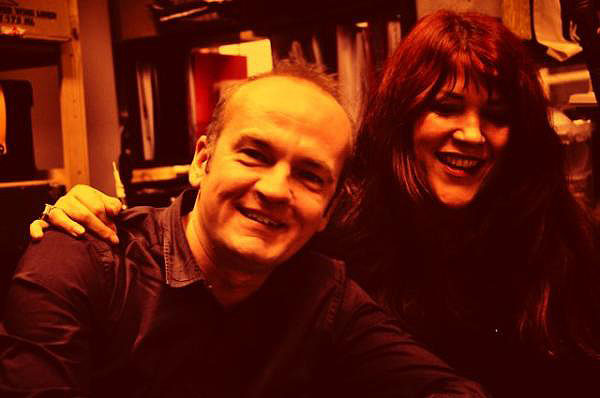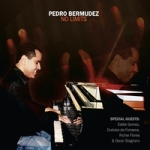Home » Jazz Articles » Interview » Christine Tobin and Liam Noble: Unraveling Tapestry
Christine Tobin and Liam Noble: Unraveling Tapestry

In 2009, Tobin and Noble got together to produce a new duo album, but instead of recording new material they took the somewhat bold step of reworking a classic '70s recording that went on to become one of the biggest-selling albums of all time—Tapestry (Columbia,1971), by Carole King. The idea of reinterpreting this album was Tobin's, but the finished work—Tapestry Unravelled (Trail Belle Records, 2010)—is the result of the unique combination of voice and piano that arose from the collaborative approach of the two musicians.
King's original recording collected together a group of songs that have, over the intervening 40 years, become part of the history of popular music. A decision to rework the entire album might be considered brave or foolhardy—and, indeed, in the hands of less confident and imaginative musicians disaster could have resulted. But Tobin has a very personal love for Tapestry, and the innovative approach that she and Noble have applied to the songs has created a body of work that stands on its own merits.
Tobin's relationship with Tapestry goes back for some years, to her early childhood and the influence of her older sister, Deirdre, who sadly died in 2009. "I grew up in Dublin and my sister had a copy of the album, not when it was first released but a few years later. I listened to it with her and I used to sing along, like you do when you're a kid. And almost effortlessly I knew the songs. I used to get asked to sing "Tapestry" as my little party piece, so I associate it with very warm memories. I think it has warm memories for many people, in fact." Indeed, for people who were at college in the early '70s, the album was almost universally part of the scene—a late-night, laidback album to play as things calmed down in the early hours. But does Tapestry mean anything to later generations? Tobin feels that it does: "I was talking to my niece about it—she's not really familiar with the album, but when I sang her some of the songs, just fragments, she'd say 'Oh, yes, I know that one,' so somehow they have filtered through."
 While Tapestry has very meaningful personal connections for Tobin, Noble's relationship with the album is more casual. How familiar was Noble with the record? According to Tobin, "He knew it, but he didn't know the tunes as well as I did." On its release the pianist was barely three or four years old: "Yeah, but it was my favorite album of the moment," Noble claims, unconvincingly, before reflecting for a few moments. In fact, Noble was aware of individual numbers rather than of the album itself: "Obviously I knew some of the songs, but I wasn't aware that they were all by Carole King... I'd actually played a lot of the songs with singers in restaurant gigs over the years. About 10 years ago I'd had the album, so I knew of it, but it had slipped out of my field of vision. So when Christine suggested doing it I kind of knew the sort of territory it was in."
While Tapestry has very meaningful personal connections for Tobin, Noble's relationship with the album is more casual. How familiar was Noble with the record? According to Tobin, "He knew it, but he didn't know the tunes as well as I did." On its release the pianist was barely three or four years old: "Yeah, but it was my favorite album of the moment," Noble claims, unconvincingly, before reflecting for a few moments. In fact, Noble was aware of individual numbers rather than of the album itself: "Obviously I knew some of the songs, but I wasn't aware that they were all by Carole King... I'd actually played a lot of the songs with singers in restaurant gigs over the years. About 10 years ago I'd had the album, so I knew of it, but it had slipped out of my field of vision. So when Christine suggested doing it I kind of knew the sort of territory it was in." The album arose from a gig which Tobin was invited to play at London's Vortex jazz club in August 2009: "That was a spontaneous, last minute, arrangement and I decided to try out the Tapestry songs. It was a quiet time of year and I wasn't expecting much of a crowd, but it turned out that it was packed. Each time I announced the title of a song I could see people nodding and smiling and everybody was saying after the gig, 'Oh, I remember exactly what was going on in my life when I first listened to the album.' So it seems to generate really warm memories."
 Noble's memory of the Vortex gig also emphasizes the spontaneity: "I don't remember what made her think of the idea—although I know that her sister had recently passed away. She said that she fancied doing it, we had one run through, and then we did the gig. It certainly wasn't played in much when we first performed it." How different was that first performance from the version that became Tapestry Unravelled? "That's a good question...it's probably not that significantly different. I guess we're both that little bit more familiar with the material. Certainly, it's taken me a while to get used to the structure of the songs—what you can change and what you can't. I try to make it a little different on every gig, but it's a very fine line. Do it too straight, it sounds too much like a restaurant gig: but you don't want it to sound too much like a jazz odyssey with too many funny chords either...There's not a huge margin for error."
Noble's memory of the Vortex gig also emphasizes the spontaneity: "I don't remember what made her think of the idea—although I know that her sister had recently passed away. She said that she fancied doing it, we had one run through, and then we did the gig. It certainly wasn't played in much when we first performed it." How different was that first performance from the version that became Tapestry Unravelled? "That's a good question...it's probably not that significantly different. I guess we're both that little bit more familiar with the material. Certainly, it's taken me a while to get used to the structure of the songs—what you can change and what you can't. I try to make it a little different on every gig, but it's a very fine line. Do it too straight, it sounds too much like a restaurant gig: but you don't want it to sound too much like a jazz odyssey with too many funny chords either...There's not a huge margin for error." The songs are primarily pop songs—does that give Noble less to play with, especially with the vocal on top? "I've always liked the combination of voice and piano. I like the way that you have to play the instrument differently, vary it from singer to singer. For example, I used to play with Anita Wardell a lot—she has a much lighter, more fragile voice. Christine's voice is very strong and it's almost like playing with a saxophonist. I know she won't hit duff notes, or if she does I hardly notice. I can slide about, underneath and in between, and she doesn't mind." The songs were written in the main for a four- or five-piece band, so a voice as soulful as Tobin's is needed to carry the songs with just the piano accompaniment. "Yes, that's the thing. I think it has to be distinctive..." agrees Noble. "Carole King has quite a lot of character in her voice."
The Vortex performance had been advertized as focusing on songs from Tapestry, but an album was not initially planned. As Tobin says: "We didn't know, when we did the gig, that we were going to do an album, but people at the gig were asking for the recording, so I thought that we should do a record—and lo and behold, that's what happened, three weeks later." Surprisingly, given the quality of the recordings on Tapestry Unravelled, Tobin and Noble had barely played the tunes together before entering the studio apart from that night at the Vortex, as Tobin explains: "Me and Liam got together just once, the night before the gig. We knew we didn't want to change the tunes and we did discuss the kind of atmosphere each piece would have. Then we tried each one out a few times, 'til it felt like we were capturing something, some magic. Then you feel like you're stepping into a slightly different world—which is what music should lead you into anyway, I believe." According to Noble, "We figured out, just by playing the songs, what was possible to change and what needed to stay the same. We arrived at a fairly straight reading of it."
 While the Tapestry Unravelled versions of the songs are instantly recognizable, this is not merely a copy of the original. "I don't usually do many covers" says Tobin "and to do almost a whole album is a big step. But I just felt that I couldn't split the songs up. They belong together." However, Tobin didn't slavishly keep to the original running order. "We didn't go in to record with a fixed order. We just went in to the studio and thought 'What shall we do first?' But I did think of the running order for the album quite a lot. Because it's just the two of us the sound is quite sparse, some of the tempos are quite slow and you don't have the punch of bass and drums. So that dictates how you actually plan out the album to get the right mood... I thought 'Beautiful' was right to put first. I sang it at Deirdre's memorial service. It seemed appropriate because she was so positive, kind and generous."
While the Tapestry Unravelled versions of the songs are instantly recognizable, this is not merely a copy of the original. "I don't usually do many covers" says Tobin "and to do almost a whole album is a big step. But I just felt that I couldn't split the songs up. They belong together." However, Tobin didn't slavishly keep to the original running order. "We didn't go in to record with a fixed order. We just went in to the studio and thought 'What shall we do first?' But I did think of the running order for the album quite a lot. Because it's just the two of us the sound is quite sparse, some of the tempos are quite slow and you don't have the punch of bass and drums. So that dictates how you actually plan out the album to get the right mood... I thought 'Beautiful' was right to put first. I sang it at Deirdre's memorial service. It seemed appropriate because she was so positive, kind and generous." "Beautiful" is a great start to the album. Tobin's voice comes out strongly from the opening note and has a real impact: an impact that's sustained across the record. Tobin acknowledges the importance of the engineer, Curtis Schwartz: "His studio is one of the best. You don't have to ask him for very much, he just knows." Noble approaches every song afresh and there is real variation in his playing—in some cases it sounds extremely complex, technically and structurally: in other cases it seems to be simple and pared down. A highlight is his playing on "So Far Away," one of the more straightforward arrangements, characterized by an exquisite solo: "Yes," says Tobin "that's my favorite. I really like his style. He's very skilful, he's studied all of the great masters and he's got an incredible imagination. For me, on that one, his solo really lets you feel this person drifting away—I can almost see pictures from it, it's very dreamlike."
 One song from the Carole King original, "Where You Lead," doesn't appear on Tapestry Unravelled. Why is that? Tobin's is confident about her decision: "Well, there were two tracks that didn't grab me in the same way as the rest. One was 'Smackwater Jack,' which is stylistically pretty different and 'Where You Lead,' which just didn't resonate with me. I wanted every song I sang to really mean something to me, so because I didn't feel that way about those songs I just decided not to do them."
One song from the Carole King original, "Where You Lead," doesn't appear on Tapestry Unravelled. Why is that? Tobin's is confident about her decision: "Well, there were two tracks that didn't grab me in the same way as the rest. One was 'Smackwater Jack,' which is stylistically pretty different and 'Where You Lead,' which just didn't resonate with me. I wanted every song I sang to really mean something to me, so because I didn't feel that way about those songs I just decided not to do them." Tobin added an original song, "Closing Time," to the album and offered Noble the chance to add one of his own. Ultimately, Noble decided against producing an original piece, deciding instead to recreate one of the tunes that Tobin had not recorded. The result is the only instrumental on the record—"Smackwater Jack." "That was kind of a last minute thing," Noble says. "Originally I was going to do a sort of improvised interlude piece, and then I thought that it would be nice to do an instrumental version of something. I see 'Smackwater Jack' as a Ray Charles, Fats Domino kind of song—a nod to that sort of music, which I've been thinking about lately in reference to my own playing. I half-thought that I ought to do it because it's on the original record, and half-relished doing it. The tune is quite slight, compared to many of the others, so it can be quite a tight line between playing the tune and making it obvious and trying to add something different." The pianist is also conscious of the tune's impact on the album as a whole: "I think the album needed it, as did the original album, because although it's quite a throwaway song it gives relief from the rest of the songs, it's nice to have something that's not quite so emotionally heavy."
"Closing Time" was written specifically for the album. As Tobin explains, "I was trying to summarize the feeling I think people get from listening to Tapestry. It's a finale piece—and I got the word 'Tapestry' into it as well." The title suggests that it was always intended to be the final track, but this isn't the case: "Well, I didn't originally plan it as the final track," she says, "I tried to fit it in earlier, when I was trying out different song orders. Despite the title it wasn't planned as the final tune. But it fitted perfectly at the end and didn't seem quite right anywhere else."
At the time of the interviews, the album's release date was still over a month away. But had there been any feedback from anyone involved in the original? "No, not yet," said Tobin. "I did a little bit of investigating and I got the name and address of Carole King's manager and sent a CD, but I haven't heard anything yet. I'd be over the moon to hear something nice back from Carole King, of course. If it makes enough ripples it might come to her attention." The album is being released on Trail Belle—Tobin's own label, which she set up specifically for this album. "It's just a name I thought up for this release. Just because it's the two of us, and my stuff tends to be more original so this is a move away. My other releases have been on Babel." Will the label continue in future? "It depends on how this album does. I certainly want to do more—we'll see."
 Tobin is known for her own writing, but she does cover the work of other songwriters and the list is wide-ranging. The Great American Songbook is represented, but so too are people like Bob Dylan, John Martyn, Leonard Cohen and Rufus Wainwright. Tobin finds these songs in a variety of ways. "I've always been a Leonard Cohen fan, and since the early '90s I've had some of his songs in my repertoire and recorded quite a few of them. I love his words, I think he's a great poet, but I've changed his music around quite radically. I do some Joni Mitchell as well. They're just great songwriters and I can't resist the temptation to get my mitts on a good song."
Tobin is known for her own writing, but she does cover the work of other songwriters and the list is wide-ranging. The Great American Songbook is represented, but so too are people like Bob Dylan, John Martyn, Leonard Cohen and Rufus Wainwright. Tobin finds these songs in a variety of ways. "I've always been a Leonard Cohen fan, and since the early '90s I've had some of his songs in my repertoire and recorded quite a few of them. I love his words, I think he's a great poet, but I've changed his music around quite radically. I do some Joni Mitchell as well. They're just great songwriters and I can't resist the temptation to get my mitts on a good song." Tobin's recording of Rufus Wainwright's "Poses"—on Secret Life Of A Girl, (Babel, 2008)—came about in a more unusual fashion: "I was working with Nick Smart, the trumpeter, on a tribute to Nick Drake at the end of 2005. For the live gigs, he wanted to put in a song from a more contemporary songwriter and he asked me to do 'Poses.' When I went to do my own recording, I decided I wanted to do it with my own band. [Guitarist] Phil Robson did the arrangement for it."
As a writer, as well as an interpreter of other people's work, Tobin has a specific approach to songs from other writers: "With other people's songs I always try to angle the tune completely differently. Sometimes it might be a groove or a bass line that I can pick up on...then I can maybe change the chords. It just develops, but usually I do change things around—change the structure or the harmony." Tobin's approach to writing is less formal: "It's a bit of a mystery, really" she says, laughing: "Generally the words come first, then it'll be the chords and probably the melody will be last. But with "Closing Time" I actually wrote the melody and the lyrics first."

Tobin's next project is already in the planning stages and it will return to her more usual way of creating an album. "It'll be mostly originals. I usually throw in a couple of non-originals as well. I've got about five new songs ready so far." The album will also see a return to a larger line up of musicians. "There are seven of us altogether: Kate Shortt on cello, Phil Robson on guitar, Liam, of course, Dave Whitford on bass, Thebe Lipere on percussion and Simon Lea on drums." This is the same line up that appeared on The Secret Life Of A Girl: Tobin's "first call" group. "Yeah, it's great because they bring so much variety to the music." They are also personally close, an aspect of the working relationship that Tobin sees as vital: "For me it's quite important to develop a musical relationship...we're all good friends. I know some people thrive on animosity, but I don't."
Noble's own most recent major album is also a contrast to the Tapestry Unravelled project. Brubeck (Basho Records, 2009) finds Noble's trio tackling some of the work of pianist Dave Brubeck, and was nominated for Album of the Year at the 2010 Parliamentary Jazz Awards.
How does Noble compare the work of Carole King and Dave Brubeck? Is it a major conceptual or technical leap to move from playing Brubeck tunes to performing King songs? "In a way it is a bit of a leap, but they tap into different sides of my musical interests. With Brubeck, I had a couple of tunes that I really wanted to play and I thought that I would really like to play his stuff because I knew that it would annoy some people. I really like his music but I can see what people don't like. But that's not my priority with music—these technical things people don't like—and there are a lot of things he was doing before Bill Evans and other people. So it felt interesting, and I thought that the fans would like it." Does this mean that British jazz audiences like familiarity? "Yes, quite a lot of them" Noble believes, "but it's a sliding scale. The average mid-point of that scale is a bit more conservative than it might be elsewhere in Europe."
As the duo play more live gigs they are starting to get some all important audience feedback. Noble is enjoying the responses: "Feedback's pretty good for the most part. It's strange, though, it's unlike a lot of jazz gigs because people know those songs and their reaction is a lot to do with hearing the songs again—almost relief that they're not disappointed. It's quite unusual for jazz musicians to take on music that's iconic in its original form. You're almost under pressure to live up to that." The audience is also different from the usual jazz audience, with many coming to gigs specifically because of the songs. Again, Noble finds this interesting and positive: "There was one gig in particular where there just seemed to be a lot of people that seemed to be from different...a different demographic...Part of the reason for doing this is to find a way of doing something that may be accessible to people but to play it in a way that we can still enjoy it...trying to play the songs like they're not already famous."
Selected Discography
Christine Tobin/Liam Noble, Tapestry Unravelled (Trail Belle Records, 2010)
Liam Noble Trio, Brubeck (Basho Records, 2009)
Christine Tobin, Secret Life Of A Girl (Babel, 2008)
Liam Noble/Ingrid Laubrock, Let's Call This (Babel, 2006)
Liam Noble, Romance Among The Fishes (Basho Records, 2005)
Christine Tobin, Romance And Revolution (Babel, 2004)
Liam Noble Group, In The Meantime (Basho Records, 2003)
Christine Tobin, You Draw The Line (Babel, 2003)
Christine Tobin, Deep Song (Babel, 2000)
Christine Tobin, House Of Women (Babel, 1998)
Christine Tobin, Yell Of The Gazelle (Babel, 1996)
Christine Tobin, Aililiu (Babel, 1995)
Photo Credits
Pages 1, 4: Curtis Schwartz
Pages 2, 3: Bruce Lindsay
Tags
christine tobin
Interview
Bruce Lindsay
Anita Wardell
Ray Charles
Fats Domino
Bob Dylan
John Martyn
Joni Mitchell
Dave Brubeck
Bill Evans
PREVIOUS / NEXT
Support All About Jazz
 All About Jazz has been a pillar of jazz since 1995, championing it as an art form and, more importantly, supporting the musicians who make it. Our enduring commitment has made "AAJ" one of the most culturally important websites of its kind, read by hundreds of thousands of fans, musicians and industry figures every month.
All About Jazz has been a pillar of jazz since 1995, championing it as an art form and, more importantly, supporting the musicians who make it. Our enduring commitment has made "AAJ" one of the most culturally important websites of its kind, read by hundreds of thousands of fans, musicians and industry figures every month.






















